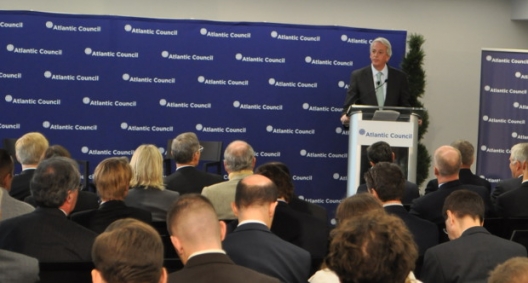 On November 12, the Transatlantic Security Initiative in the Atlantic Council’s Brent Scowcroft Center on International Security hosted a conference on NATO’s Deterrence and Collective Defense in partnership with the Norwegian Institute for Defence Studies.
On November 12, the Transatlantic Security Initiative in the Atlantic Council’s Brent Scowcroft Center on International Security hosted a conference on NATO’s Deterrence and Collective Defense in partnership with the Norwegian Institute for Defence Studies.
Transcripts Panel 1 |
Deterrence, a security strategy concept borne out of the early days of the Cold War, has been a linchpin of transatlantic security since NATO’s inception in 1949. While traditional tools of deterrence including nuclear weapons, conventional weapons, and missile defense still anchor Alliance security, NATO must update its concepts and tools of deterrence to fit twenty-first century threats. Deterrence will remain a crucial concept for international security in the future, but NATO still thinks about it in outdated ways.
This conference sought to breathe life into the current tired conversations about deterrence and collective defense. The conference convened leading experts to discuss how NATO can deter nonstate actors, integrate space, cyber, economic, and other levers into its deterrence calculus, and how new global trends such as disruptive technologies, a nascent Asia-Pacific, and the rise of empowered individuals will impact NATO’s deterrence and collective defense posture. NATO must seize on the window of opportunity provided by the drawdown in Afghanistan and the upcoming 2014 Summit to redefine how deterrence and collective defense concepts fold into transatlantic security.
Conference panelists also discussed the future of traditional force posture in Europe, innovative and economical approaches to bolstering missile defense architectures in Europe, threats from Iran in light of recent diplomatic efforts to curb the country’s nuclear program, and how NATO can utilize traditional deterrence tools to counter emerging security threats.
Video Playlist
Luncheon Keynote Conversation
The conference’s luncheon conversation featured Ambassador Ivo H. Daalder, former US permanent representative to NATO, in his first public speech on NATO since leaving his posting. Ambassador Daalder concluded that NATO in the twenty-first century is not a deterrent alliance, but rather an operational alliance. Therefore, according to Ambassador Daalder, the Alliance should redirect nuclear capability funds to conventional capabilities, as nuclear weapons will not be relevant to “99.99%” of NATO’s future missions.
Ambassador Daalder also argued that Europe’s defense budget cuts are unsustainable for NATO’s current defense and crisis management capabilities, as European contribution shortfalls in Libya demonstrated. He posited that Smart Defense, NATO’s flagship initiative to pool and share defense resources during an era of austerity, is a viable concept for small groups of countries (such as the Benelux countries, the Visegrad Group, and the Baltic states), but it will not work for NATO’s largest European members: Germany, France and the United Kingdom.
Expert Panelists
The conference’s panels on NATO deterrence and collective defense strategies featured leading experts on NATO’s collective defense postures and deterrent capabilities, including:
- James E. Cartwright, Harold Brown Chair in Defense Policy Studies, Center for Strategic and International Studies; former Vice Chairman of the Joint Chiefs of Staff at the US Department of Defense
- Kurt Volker, Executive Director, McCain Institute for International Leadership, Arizona State University; former Permanent Representative of the United States to NATO
- Svein Efjestad, Policy Director, Royal Norwegian Ministry of Defense
- Stefano Stefanini , Nonresident Senior Fellow, Brent Scowcroft Center on International Security, Atlantic Council; former Permanent Representative of Italy to NATO
- Madelyn Creedon, Assistant Secretary of Defense for Global Strategic Affairs, US Department of Defense
- Walter B. Slocombe, Secretary, Atlantic Council Board of Directors; former Under Secretary of Defense for Policy at the US Department of Defense
- Patrick O’Reilly, Nonresident Senior Fellow, Brent Scowcroft Center on International Security, Atlantic Council; former Director of the Missile Defense Agency
- Damon Wilson, Executive Vice President, Atlantic Council
- Ian Brzezinski, Senior Fellow, Brent Scowcroft Center on International Security, Atlantic Council
- Barry Pavel, Vice President and Director, Brent Scowcroft Center on International Security, Atlantic Council
